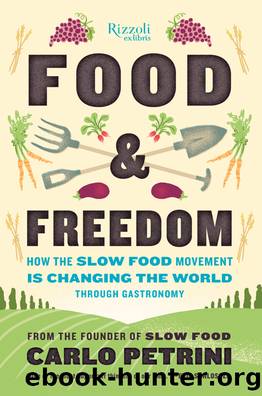Food & Freedom by Carlo Petrini

Author:Carlo Petrini [Petrini, Carlo]
Language: eng
Format: epub
ISBN: 978-0-8478-4721-1
Publisher: Rizzoli
Published: 2015-08-31T16:00:00+00:00
CHAPTER 10
TOOLS
If you look for the word “liberation” in the dictionary, one of the definitions will refer to its use in chemistry and physics. The liberation of energy is “release as a result of chemical reaction or physical decomposition.” Diversity is our tool for releasing energy and making it available to the world so the world can change. Which is why we decided to embody it fully in the Slow Food that emerged from its 2012 congress. In the association’s management bodies, which previously had been chosen in proportion to the number of each country’s members, we decided to open up to quality as well as quantity. This is how people like Helianti Hilman, Phrang, and many others from Africa and South America, who I shall introduce later, were nominated. These are all people we met and began working with thanks to the advent of Terra Madre. They do not bring us new members—we cannot impose the idea of traditional Western associationalism on the whole world—but they do bring the humanity and fertility of their communities.
Change may have taken a long time, decades, in fact, but it always comes eventually if you trust in diversity. Now there is no turning back and change sometimes risks overtaking us. This is what the journey embarked upon in the Langa hills thirty years ago has made us: it has allowed us to embrace all the faces, all the skills, all the foods, all the visions of existence that our friends on every continent bring. Believe me, getting to know these people in the course of time, seeing them in their own homelands, then all together at events, is something that takes the breath away and makes the imagination fly. It makes one think what the earth and its principal fruit, food, would be if only everyone allowed this energy to be released, if standardization, waste, and “free market” were to be replaced by respect, exchange, or even only curiosity. I am confident that diversity will come out on top because there is no way of stopping it. It is already winning.
I have told a number of stories about Brazil in this chapter because Brazil is paradigmatic for my argument. In a blog article on July 30, 2013, my friend, the internationally renowned sociologist Domenico De Masi, wrote about Pope Francis’s historic visit to Rio de Janeiro, where he was greeted by huge crowds. Just a fortnight earlier, the same crowds had demonstrated against government corruption and social policies. The Pope, nonconformist as ever, surprised everyone with symbolic gestures and his often unorthodox words. There is something about De Masi’s article that brings to mind the story of Cravero, the Bra missionary in Brazil:
Whatever happens in Brazil, even the arrival of a brand new Pope, it’s always Brazil that wins. That’s what happened with the Portuguese, and that’s what happened with the Americans. Anthropologists call it syncretism. What it really is is the victory of a centuries-old culture of hospitality, happiness, and eroticism. As
Download
This site does not store any files on its server. We only index and link to content provided by other sites. Please contact the content providers to delete copyright contents if any and email us, we'll remove relevant links or contents immediately.
The Secret History by Donna Tartt(16621)
The Social Justice Warrior Handbook by Lisa De Pasquale(11489)
Thirteen Reasons Why by Jay Asher(7788)
This Is How You Lose Her by Junot Diaz(5769)
Weapons of Math Destruction by Cathy O'Neil(5036)
Zero to One by Peter Thiel(4824)
The Myth of the Strong Leader by Archie Brown(4789)
Promise Me, Dad by Joe Biden(4447)
Beartown by Fredrik Backman(4415)
Stone's Rules by Roger Stone(4415)
How Democracies Die by Steven Levitsky & Daniel Ziblatt(4398)
The Fire Next Time by James Baldwin(4342)
100 Deadly Skills by Clint Emerson(4076)
A Higher Loyalty: Truth, Lies, and Leadership by James Comey(4032)
Rise and Kill First by Ronen Bergman(4012)
The David Icke Guide to the Global Conspiracy (and how to end it) by David Icke(3881)
The Farm by Tom Rob Smith(3872)
Secrecy World by Jake Bernstein(3782)
The Doomsday Machine by Daniel Ellsberg(3730)
